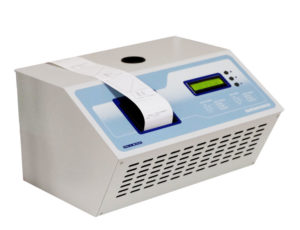Tartaric stability
Tartarcheck: tartaric stability in wine
Tartarcheck is an instrument for monitoring the tartaric stability which allows to evaluate how to stabilize, saving on the process and ensuring quality. Tartarcheck works on the principle of accelerating the THK precipitation, by adding it in excess as fine crystals.
The precipitation kinetics is followed by measuring the sample’s electrical conductivity, which depends on the ions in solution (so not yet precipitated), in a thermostated chamber whose temperature follows a pre-set time profile, by a microcomputer-controlled Peltier heat pump.
The instrument is complete and compact, with LCD display and thermal printer, and can be connected to external
computer via RS232C.
It does not need other external elements to work.
COMMON TECHNICAL FEATURES
Conductivity:
Conversion from 16 Bit to D/A
Conductivity range: 0-4000 μS/cm
Sensibility: ±2 μS
Accuracy: ±2 μS
Thermometer:
Semiconductor thermal sensor
Temperature range: -5/35 °C
Sensibility: 0.01 °C
Accuracy: 0.01 °C
MAIN DIFFERENCES
Data storage:
Tartarcheck Thermal printer releasing a receipt at the end of the analysis; No data storage
Tartarcheck Plus Tablet touchscreen (no printer) with data storage; PDF analysis report, can be
downloaded from the inner archive to PC or mobile via wi-fi connection
Control panel:
Tartarcheck with buttons
Tartarcheck Plus Touchscreen tablet






